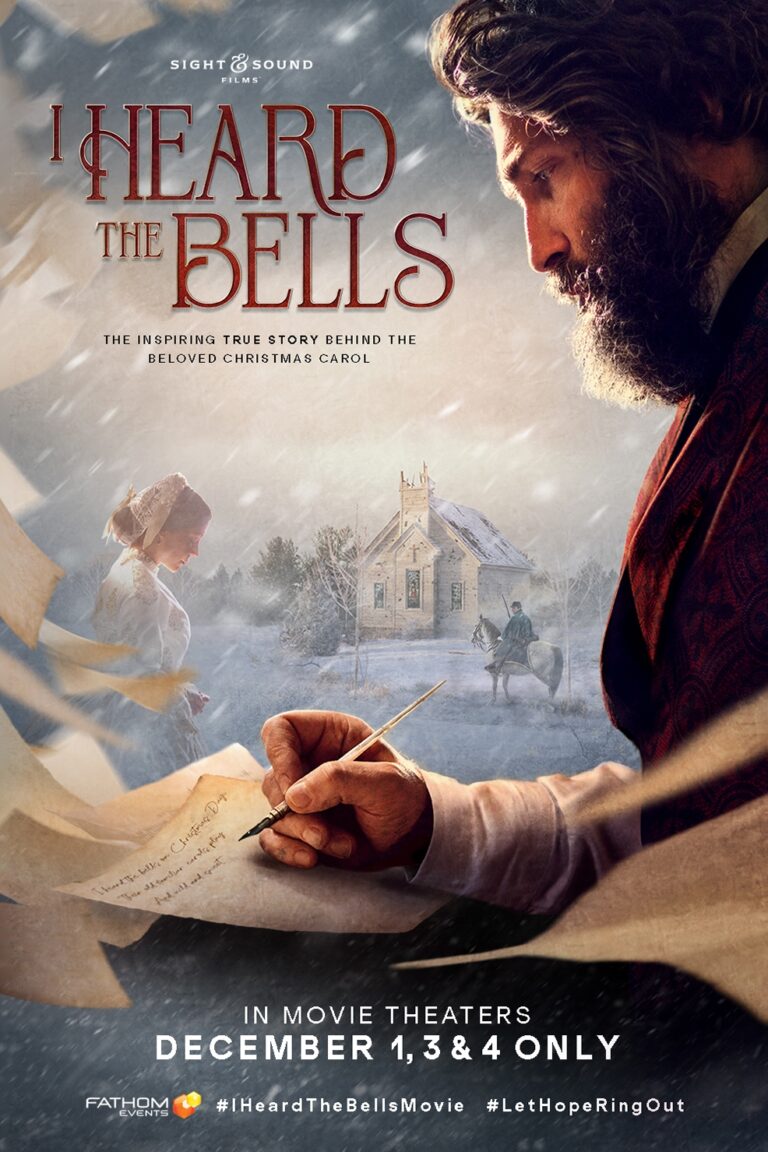“God’s Faithfulness Frees the Bonds of Grief”

| None | Light | Moderate | Heavy | |
|---|---|---|---|---|
| Language | ||||
| Violence | ||||
| Sex | ||||
| Nudity |
What You Need To Know:
I HEARD THE BELLS is incredibly well-acted and produced. Despite grief, the movie champions the gifts of family, faith and hope in the face of the darkness of tragedy and Civil War. The movie suffers from some slow pacing, but it’s a wonderful Christmas movie with scenes of prayer, church, salvation, communion, and song. I HEARD THE BELLS points viewers to the goodness of Christ, and the freedom that comes through Him. Because of some violence and mature themes about grief, MOVIEGUIDE® advises caution for younger children.
Content:
Strong Christian and biblical worldview, many Christian elements like prayer, church, and even a powerful scene about Franny’s conversion, Christ is championed, and it is the faithfulness and goodness of God that eventually helps Longfellow appreciate his family and overcome his grief
No foul language
While not graphic, the movie deals directly with death, Franny’s dress catches on fire, and Longfellow jumps on the flames to try to save her, his burned face and hands are shown, they hold a funeral for Franny, he visits her grave, several scenes of injured Civil War soldiers and some scenes of the war, a man is shot, and some blood is shown, while realistic, the injury is not overly graphic
No sex
No nudity Alcohol Use/Abuse: Some alcohol is drunk at parties, but no one is drunk
There is mention of pain medications for Longfellow’s burns, but it’s insinuated that he uses them in bigger doses than required; and,
Many of the conversations surround grief, including the death and miscarriage of Longfellow’s first wife and child, and conversations about Franny’s death and the death of their first child, but the grief ends on an inspiring note of hope and gratitude for God’s faithfulness.
More Detail:
The movie starts with one of Longfellow’s quotes, which reads, “Every man has his secret sorrows which the world knows not; and, oftentimes we call a man cold when he is only sad.” The movie cuts to the famous American poet, Henry Wadsworth Longfellow, as he sits down at a writing desk, picks up his pen and begins writing in his Cambridge home in 1863. The movie flashes back to Christmas Eve three years earlier, as Longfellow, his wife Franny and their four children are in a church service.
The family home is full of artists, but times are tough as the North fights to free the slaves in the South. Longfellow is renowned worldwide but only manages to cope with the limelight because of the support of his wife. The couple are invited to dinners with senators, and his poems about the horror of slavery are read during dinner.
Despite the difficult times, the Longfellows are happy to be together as a family. However, tragedy strikes on July 9, 1861, when Franny dies due to her dress catching on fire. Henry is badly burned after trying to put the fire out.
Distraught and angry, Henry stops writing and grows distant from his children. His eldest son, Charley, wants to enlist. Against his father’s wishes, Charley joins the Northern Army. Henry, who’s friends with a Massachusetts senator, asks that his son be promoted so that he doesn’t fight on the front lines.
However, while fighting in Virginia, Charley is shot and badly injured. Longfellow goes to find his son and bring him home. While Charley makes a recovery from his injuries, he discusses his anger and grief with his father. Charley reveals that he expected to die, but that he found hope and faith again in God.
Inspired by his son and thankful for his survival, Longfellow stays up late on Christmas eve in 1863 to write the words to his famous poem, “Christmas Bells.” However, what was meant to be a hopeful poem about God’s faithfulness to his people, Longfellow is overwhelmed by his grief and puts the poem down until morning.
Will the Christmas morning light help Longfellow realize the goodness of God to him and his family?
I HEARD THE BELLS is incredibly well-acted and produced. Despite its truth about the tragedy in Longfellow’s life, the movie ultimately champions the gifts of family, faith, and hope in the face of the darkness of family tragedy and the violent chaos of the Civil War. The movie suffers from some slow pacing, but it’s a wonderful Christmas movie with scenes of prayer, church, salvation, communion, and song. I HEARD THE BELLS points viewers to the goodness of Jesus Christ and the freedom that comes through Him. However, because of some violence and mature themes about grief, MOVIEGUIDE® advises caution for younger children.


 - Content:
- Content: 
